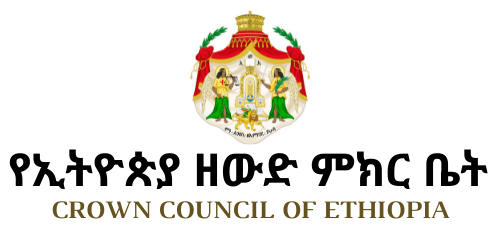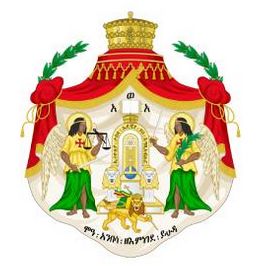There has been another call in the United States Congress, the second this month, for US support for the restoration of the Ethiopian Crown as a step toward easing tensions and conflict in the Horn of Africa. Congressman Jim Saxton (Republican, New Jersey), a senior member of the House of Representatives National Security Committee, and Chairman of the House Task Force on Terrorism & Unconventional Warfare, said on February 24 that the President of the Ethiopian Crown Council, Prince Ermias Sahle-Selassie Haile-Selassie was “someone who understands, and can help stabilize the entire Horn of Africa”.
Congressman Saxton noted: “The situation is now becoming critical, and we must find ways to support him in the process of reunifying Ethiopia, which cannot be allowed to be dismembered, and in helping to bring about regional reconciliation—thus protecting and furthering national security interests of the United States and its close allies.”
The full text of Congressman Saxton’s remarks are as follows:
Mr. SAXTON. Mr. Speaker, I spoke on February 9, 1999, to remark that it was essential that we act to help stop the escalation of the crisis in the Horn of Africa, and particularly the Ethiopia-Eritrean war, if the region was not to slide further into chaos. Since then, the anticipated war between Ethiopia and Eritrea has erupted and it keeps escalating. The war has already long-term and dire ramifications for both countries—beyond the impact of the growing numbers of casualties on both sides. The war is largely a low-tech and fairly static war of attrition along long miles of rugged and inhospitable terrain. The new offensive just launched by the Ethiopians is yet to alter the overall character of the war. However, both sides have embarked on an intense effort to acquire high quality air power in order to break the deadlock. Both countries not only purchased several late model combat aircraft and helicopters from states of the former Soviet Union but also engaged a large number of air crews and technicians to fly and maintain them. This effort, that is yet to impact the situation on the front line, is rapidly exhausting the hard currency holdings of these already impoverished states, thus further reducing their chance of economic recovery and development.
Dire as the situation in the Horn of Africa is, and as much as the casualties are lamentable, it is a valid question to ask: Why should we—the United States—care about yet another debilitating war in a remote part of Africa? Fortunately, the war has so far had little impact on the civilian population, there were no massacres, and there is no famine. Hence, there is no humanitarian catastrophe to attract our attention. Hence, I repeat, why should we care?
The reason we should pay close attention to the mounting crisis and escalating war is the vital strategic importance of the Horn of Africa to the United States and its close allies. The geo-strategic position of Ethiopia is central to several mega-dynamics stretching all the way from the Middle East to East Africa. Thus, the impact of instability and war reverberates directly to the heart of such areas commonly accepted as vital interests of the United States as Israel or the oil producing states of the Persian Gulf. Here are several major strategic factors in the region, demonstrating its great importance to the security interests of the United States:
1. The security of the Red Sea/Suez Canal Sea Lane of Communication (SLOC), which vitally affects EastWest trade (not just the oil trade) between Europe and Asia, including particularly Japan and Australia. Within this context, the ability of Israel and Jordan to maintain adequate maritime access to the Red Sea (and therefore world trade) is significant.
2. The containment of the spread of Islamist radicalism and terrorism—a process currently sponsored by Sudan’s National Islamic Front (NIF) Government with the assistance of Iran. The hub of international terrorism in Sudan supports subversion throughout the Arab world and East Africa. A personal patron of Osama bin Laden, Hassan al-Turabi, Sudan’s spiritual leader, was instrumental in inspiring and sponsoring the bombing of the U.S. Embassies in Kenya and Tanzania. Having sponsored the eviction of the United States from Somalia, Khartoum is now trying to capitalize on the crisis in the Horn of Africa in order to evict the United States from the rest of this strategically critical area. Toward this end, the Islamists support several Islamist separatist movements in both Eritrea and Ethiopia, most notably the support for the radical separatist Oromo forces designed to break up Ethiopia still further.
3. The management of the Nile waters is critical to the stability, prosperity and growth of Sudan and Egypt, and therefore the stability of the entire Middle East. Egypt is completely dependent on the Nile water for its very existence and Cairo will therefore do anything to ensure the Nile’s uninterrupted flow—including joining the radicals of the Muslim world, turning on the United States, Saudi Arabia, and Israel, etc. Sudan is also the driving force behind and key sponsor of the destabilization of Egypt. Gaining a foothold in Ethiopia will provide Khartoum with the possibility to manipulate the Nile’s flow without direct implications.
Thus, stability in the Horn of Africa, and especially the existence of a unified and pro-Western Ethiopia, is of crucial importance to the national security of the United States. We must care and worry about the escalation of the Ethiopia-Eritrea war and the Sudan-sponsored Islamist forces exploiting it. This position is shared by the Ethiopian Crown Council. In my previous comments, I urged that we help reinforce the position of Prince Ermias Sahle-Selassie, the President of the Crown Council of Ethiopia, who is attempting to restore a policy of unity and moderation on Ethiopia and the region. Recently, Prince Ermias has written an excellent analysis of the crisis for the Defense & Foreign Affairs: Strategic Policy, the journal of the respected International Strategic Studies Association. In this overview, he urges that we see the Eritrea-Ethiopia conflict in the context of the broader regional strategic situation, to ensure that radicalization of the region. Prince Ermias stresses the dire ramifications of the deteriorating situation in Ethiopia:
“What we see now [in Ethiopia] is far less democracy and opportunity and prosperity than was being created under the Constitutional Monarchy of Haile Selassie. What we are witnessing today is a society led by people who arrived on the scene by accident; who are mired in divisive, petty squabbling. The result is that the region is divided and at risk. And the risk is one shared by the entire world: a further breakdown in the region could lead to the collapse of the pivotal powers, and a total disruption of the trade routes and the Middle Eastern oil trade. But worse than this, by not seeing the Ethiopia-Eritrea dispute in the broader context and acting accordingly, the world may be condemning the peoples of the region, including those of Egypt and North Africa, Arabia and the Northern Tier, to many more years of despair.”
I share the view and the anguish. I add that the strategic posture of the United States is adversely affected by the reverberations from, and impact of, the continued war in the Horn of Africa. This is why we should not only pay attention to events there, but also act to bring an end to the war. However, any negotiated settlement that would leave the regional strategic posture unchanged would only be a short term and temporary solution. Ultimately, it is imperative that long-term solutions are attained—nation building and economic revitalization under condition conducive for flow of private funds, not just hand outs of humanitarian assistance.
What makes the situation in the Horn of Africa so unique is that there is no need for a US military intervention in order to establish such stability. There are indigenous forces in Ethiopia that, if properly supported, can help their own country and the entire region. I’m talking about the Ethiopian Crown Council. Constitutional monarchy, as was the case in the days of Emperor Haile Selassie, provides the best opportunity for Ethiopia. Mr Speaker, it is clear that in Prince Ermias we have someone who understands, and can help stabilize the entire Horn of Africa. The situation is now becoming critical, and we must find ways to support him in the process of reunifying Ethiopia, which cannot be allowed to be dismembered, and in helping to bring about regional reconciliation—thus protecting and furthering national security interests of the United States and its close allies.
Congressman Saxton is also former Chairman, and currently Vice-Chairman, of the Joint Economic Committee of Congress, the joint House-Senate body which has a major say in US foreign aid and economic policies.








